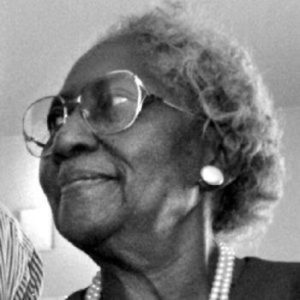
Johnnie Carr
*Johnnie Carr was born on this date in 1911. She was a Black Activist and nurse.
From Alabama, Johnnie Rebecca Daniels was the daughter of parents John and Annie Richmond Daniels, the youngest of six children. When she was nine, her father died; following his death, the family moved away from their farm to the nearby city of Montgomery, Alabama. The family sought better educational opportunities than the six-month school year in their previous rural residence. Carr attended two private schools: the Bredding School and Alice L. White’s Industrial School for Girls, also known as the Montgomery Industrial School.
At the Industrial School, which Carr claimed was “started by whites from the north," young Carr met and befriended young Rosa Louise McCauley, who eventually grew up as civil rights icon Rosa Parks. Before she graduated from high school, Carr married Jack Jordan when she was sixteen to lessen her mother’s burden of being the sole caretaker of the family. The couple had two daughters.
After breaking the marriage, Carr became a practicing nurse and insurance agent while her mother cared for her children. In February 1944, Carr remarried Arlam Carr. The previous year, in 1943, the Carr’s moved into their home across from Oak Park, a park separating black and white neighborhoods in Montgomery. She gave birth to their only child, Arlam Jr., in 1951. She began her civil rights work as early as 1931 when she raised money during the Scottsboro trials for the defense of the nine wrongly accused boys. In the late 1930s, after attending an event at Hall Baptist Church, Carr joined her local chapter of the NAACP.
She began working as a youth director and secretary under the chapter's president. In addition to working with E.D. Nixon, Carr once again met her childhood friend Rosa Parks, who she had not seen since 1927. In 1944, Carr, along with her husband Arlam Carr, Rosa Parks, Raymond Parks, E.D. Nixon, E. G. Jackson, and Irene West, organized to defend Recy Taylor, a woman who six white men gang-raped after attending a church service at Rock Hill Holiness Church in Abbeville, Alabama. This core of activists, who canvassed neighborhoods, raised money and sent petitions and postcards to the governor and attorney general of Alabama, later became part of the movement that supported Martin Luther King Jr. Taylor’s attackers were not indicted.
On December 1, 1955, Carr received a call from Nixon, who said, “They’ve arrested Rosa. They got ‘the wrong woman.’” This was the beginning of the Montgomery Bus Boycott, and Carr attended the formative mass meeting on December 5, 1955 (the same day as Rosa Parks’ trial) in Holt Street Baptist Church. This mass meeting precipitated the creation of the Montgomery Improvement Association (MIA), which went on to organize the Bus Boycott throughout its existence. Carr served on committees, spoke at the Monday mass meetings of the association, and helped organize carpool systems for those who needed transportation. At the same time, the boycott drew on, becoming an important and recognizable leader in the MIA. Carr and her husband participated in the carpool system by transporting boycott participants, even though the Montgomery law enforcement tried to stop boycott participants from using personal transportation networks because the MIA ran mass transportation without due licensure.
The MIA eventually faced a court injunction for the group’s carpooling in 1956. Still, before the injunction took effect, the Supreme Court case that ended Montgomery’s bus segregation, Gayle v. Browder, was decided in favor of the cause of the boycott of participants. In 1964, the Carrs challenged the segregation of Montgomery County schools with the help of attorney Fred Gray. Carr’s son Arlam Jr. sought to attend Sidney Lanier High School even though it only accepted white students. Two other families originally joined the suit but retracted out of fear of retaliation. The Carr’s dealt with threatening phone calls and tried to avoid possible bomb injuries by moving their beds away from the front part of their home and prohibiting neighbors from guarding their house.
On March 22, 1966, Federal Judge Frank M. Johnson Jr. ruled in favor of Carr. The Montgomery County school system was forced to integrate with a choice form that allowed students and parents to decide which Montgomery school to attend. Arlam Carr Jr. enrolled in Sidney Lanier High School with twelve other black students.
In 1967, Carr became President of the Montgomery Improvement Association. The MIA continued to work in Montgomery, with the association generating money for scholarships and establishing voter registration efforts. According to Morris Dees, one of three founders of Montgomery's Southern Poverty Law Center, "Johnnie Carr is one of the three major icons of the Civil Rights Movement: Dr. King, Rosa Parks, and Johnnie Carr. Ultimately, when the final history books are written, she'll be one of the few people remembered for that terrific movement." Former U.S. Representative John Lewis, D-Ga., said, "Mrs. Carr must be looked on as one of the founders of a new America because she was there with Rosa Parks, E. D. Nixon, Martin Luther King Jr., and so many others."
Johnnie Carr died of a stroke at the age of 97 on February 22, 2008. She actively served as the President of the MIA until her death. Two months after she died, the Montgomery Public School Board voted to name their new middle school in her honor. The Johnnie R. Carr Middle School was completed on August 7, 2009. The county superintendent, John Dilworth, lauded Carr for encouraging active education and community membership among students. The school also runs the Carr Magnet Program, challenging advanced students with more rigorous study. The Johnnie R. Carr Gymnasium in the Goode Street Community Center in Montgomery, Alabama, is also named in her honor.
The Town of Carrboro, North Carolina, is considering changing its namesake from White Supremacist Julian Carr to Johnnie Carr, born the same year the town was incorporated.